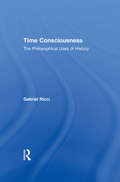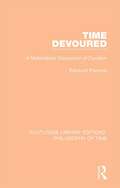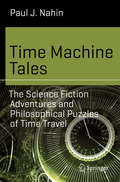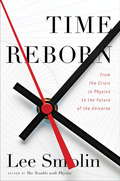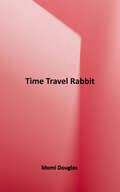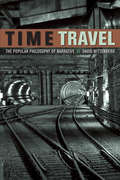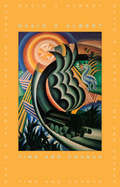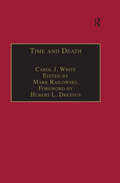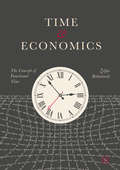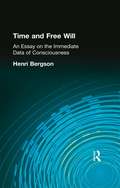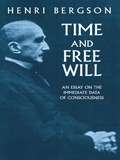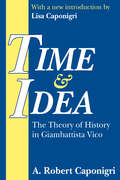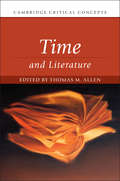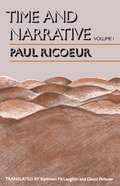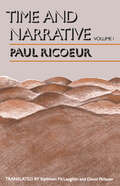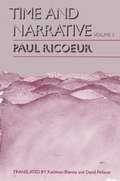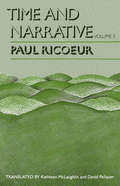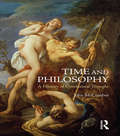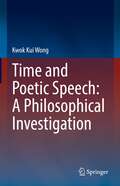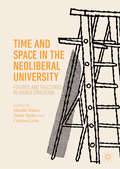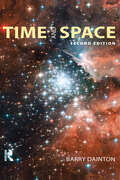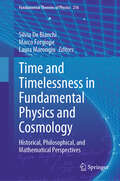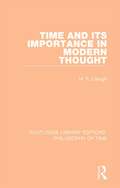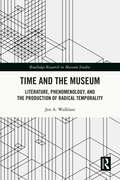- Table View
- List View
Time Consciousness: The Philosophical Uses of History
by Gabriel R. RicciTraditional metaphysics is hostile to the world of the senses. From Plato to Kant, philosophers have demanded that the sensuous and corporeal aspects of existence be circumscribed by rational conditions and properties. Without these, the sensuous is unintelligible. This elevation of the ability to reason as quintessentially human has obscured efforts to acknowledge the pivotal role the historical imagination has in grounding experience. In The Philosophical Uses of History, Gabriel Ricci explores the opposite tendency, from Vico to Heidegger, to emphasize temporal and historical foundations of human consciousness.Ricci's goal is to demonstrate the reciprocity of history and philosophy. He challenges the epistemological construction of the subject-object relationship and the facile dualism originating from Descartes. Arguing that consciousness must be defined in time and space, he shows how Vico's philosophy of humanity, with its historical epistemology, resurrects the practical implications of ancient philosophy's demand that knowledge and truth derive from a productive process. Ricci analyzes Heidegger's philosophy as the modern embodiment of the temporality of consciousness, and he demonstrates the origins of his particular interpretation of human existence in Rickert's and Windelband's delineation of the historical and natural sciences.Ricci links their influence to Heidegger's dissent over Ranke's objectivist methodology, which ended with Heiddegger's emphasis of the historical character of human existence. Finally, the author argues for the compatibility of Heidegger's early existential analytic and his later investigation of poetry and his critique of the technological idiom which had colonized philosophy. In doing so, Ricci highlights the metaphoric and figurative predisposition of mind as synthetic functions of historical consciousness.In offering a thoroughly temporal interpretation of mind, Ricci illuminates the relationship between philosophy and history, poetry, the cognitive sciences, and the natural sciences. This work will be of interest to philosophers, literary scholars, and cultural historians.
Time Devoured: A Materialistic Discussion of Duration (Routledge Library Editions: Philosophy of Time #5)
by Edmund ParsonsOriginally published in 1964. This lively, challenging book, written with enthusiasm, conviction and clarity, sets out to elucidate the shadowy concept of Time. This involves central philosophical issues, which are vigorously discussed. Also relativity theory, in a clear-cut exposition, is made intelligible in a new light. All who are interested in science and its philosophical implications will find this book highly controversial but certainly readable.The author believes philosophy to be important, not only for its professionals, but for everyman. He believes that the fact that this is no longer realised shows that something is wrong with professional philosophy; he also indicates what this is. The book ends, surprisingly but pertinently, with a bold plunge into the questions of telepathy, precognition and psychical research generally. Whilst the phenomena are reasonably admitted, trenchant criticism of their significance confronts parapsychologists.
Time Machine Tales
by Paul J. NahinThis book contains a broad overview of time travel in science fiction, along with a detailed examination of the philosophical implications of time travel. The emphasis of this book is now on the philosophical and on science fiction, rather than on physics, as in the author's earlier books on the subject. In that spirit there are, for example, no Tech Notes filled with algebra, integrals, and differential equations, as there are in the first and second editions of TIME MACHINES. Writing about time travel is, today, a respectable business. It hasn't always been so. After all, time travel, prima facie, appears to violate a fundamental law of nature; every effect has a cause, with the cause occurring before the effect. Time travel to the past, however, seems to allow, indeed to demand, backwards causation, with an effect (the time traveler emerging into the past as he exits from his time machine) occurring before its cause (the time traveler pushing the start button on his machine's control panel to start his trip backward through time). Time Machine Tales includes new discussions of the advances by physicists and philosophers that have appeared since the publication of TIME MACHINES in 1999, examples of which are the chapters on time travel paradoxes. Those chapters have been brought up-to-date with the latest philosophical thinking on the paradoxes.
Time Reborn
by Lee SmolinSince the ancients, physicists have argued that time is not real, that we may think we experience time passing but it's just a human illusion in a timeless universe operating on predetermined laws. Lee brilliantly shows how this thinking came about from our deep need for stability and the eternal, but that indeed time may be the only thing that is real.Since the ancients, physicists have argued that time is not real, that we may think we experience time passing but it's just a human illusion in a timeless universe operating on predetermined laws. Lee brilliantly shows how this thinking came about from our deep need for stability and the eternal, but that indeed time may be the only thing that is real.From the Hardcover edition.
Time Travel Rabbit
by Momi DouglasThis book explores the notions that time travel, interspecies communication, and the connection of the individual to the whole are not only possible but real and definable, both in scientific and metaphysical terms. These concepts are revealed within an adventure story about two inhabitants of planet Earth, an elderly professor doing clandestine teleportation research, and a young mysterious rabbit who appears to be much more than he is. The information contained in this book originates with the author's actual life experiences and dream conversations with his rabbit friend, Mr. Pebbles. This book fulfills a promise to Mr. Pebbles to publish information about the true relationship between humans and their planet.
Time Travel: The Popular Philosophy of Narrative (Gothic Fantasy Ser.)
by David WittenbergThis book argues that time travel fiction is a narrative “laboratory,” a setting for thought experiments in which essential theoretical questions about storytelling—and, by extension, about the philosophy of temporality, history, and subjectivity—are represented in the form of literal devices and plots.Drawing on physics, philosophy, narrative theory, psychoanalysis, and film theory, the book links innovations in time travel fiction to specific shifts in the popularization of science, from evolutionary biology in the late 1800s, through relativity and quantum physics in the mid–20th century, to more recent “multiverse” cosmologies. Wittenberg shows how increasing awareness of new scientific models leads to surprising innovations in the literary “time machine,” which evolves from a “vehicle” used chiefly for sociopolitical commentary into a psychological and narratological device capable of exploring with great sophistication the temporal structure and significance of subjects, viewpoints, and historical events.The book covers work by well-known time travel writers such as H. G. Wells, Edward Bellamy, Robert Heinlein, Samuel Delany, and Harlan Ellison, as well as pulp fiction writers of the 1920s through the 1940s, popular and avant-garde postwar science fiction, television shows such as “The Twilight Zone” and “Star Trek,” andcurrent cinema. Literature, film, and TV are read alongside theoretical work ranging from Einstein, Schrödinger, and Stephen Hawking to Gérard Genette, David Lewis, and Gilles Deleuze. Wittenberg argues that even the most mainstream audiences of popular time travel fiction and cinema are vigorously engaged with many of the same questions about temporality, identity, and history that concern literary theorists, media and film scholars, and philosophers.
Time and Chance
by David Z AlbertThis study is an attempt to get to the root of the tension between the best scientific pictures of the physical structure of the world and the everyday, empirical experience of it. It examines the problem of the direction of time - the notion that whatever can happen, can happen backwards.
Time and Chance
by David Z. ALBERTThis book is an attempt to get to the bottom of an acute and perennial tension between our best scientific pictures of the fundamental physical structure of the world and our everyday empirical experience of it. The trouble is about the direction of time. The situation (very briefly) is that it is a consequence of almost every one of those fundamental scientific pictures--and that it is at the same time radically at odds with our common sense--that whatever can happen can just as naturally happen backwards. Albert provides an unprecedentedly clear, lively, and systematic new account--in the context of a Newtonian-Mechanical picture of the world--of the ultimate origins of the statistical regularities we see around us, of the temporal irreversibility of the Second Law of Thermodynamics, of the asymmetries in our epistemic access to the past and the future, and of our conviction that by acting now we can affect the future but not the past. Then, in the final section of the book, he generalizes the Newtonian picture to the quantum-mechanical case and (most interestingly) suggests a very deep potential connection between the problem of the direction of time and the quantum-mechanical measurement problem. The book aims to be both an original contribution to the present scientific and philosophical understanding of these matters at the most advanced level, and something in the nature of an elementary textbook on the subject accessible to interested high-school students. Table of Contents: Preface 1. Time-Reversal Invariance 2. Thermodynamics 3. Statistical Mechanics 4. The Reversibility Objections and the Past-Hypothesis 5. The Scope of Thermodynamics 6. The Asymmetries of Knowledge and Intervention 7. Quantum Mechanics Appendix: Gedankenexperiments with Heat Engines Index Reviews of this book: The foundations of statistical mechanisms are often presented in physics textbooks in a rather obscure and confused way. By challenging common ways of thinking about this subject, Time and Chance can do quite a lot to improve this situation.--Jean Bricmont, ScienceAlbert is perfecting a style of foundational analysis that is uniquely his own...It has a surgical precision...and it is ruthless with pretensions. The foundations of thermodynamics is a topic that has accumulated a good deal of dead wood; this is a fire that will burn and burn.--Simon W. Saunders, Oxford UniversityAs usual with Albert's work, the exposition is brisk and to the point, and exceptionally clear...The book will be an extremely valuable contribution to the literature on the subject of philosophical issues in thermodynamics and statistical mechanics, a literature which has been thin on the ground but is now growing as it deserves to.--Lawrence Sklar, University of Michigan
Time and Death: Heidegger's Analysis of Finitude (Intersections: Continental and Analytic Philosophy)
by Carol J. White edited by RalkowskiIn Time and Death Carol White articulates a vision of Martin Heidegger's work which grows out of a new understanding of what he was trying to address in his discussion of death. Acknowledging that the discussion of this issue in Heidegger's major work Being and Time is often far from clear, White presents a new interpretation of Heidegger which short-circuits many of the traditional criticisms. White claims that we are all in a better position to understand Heidegger's insights after fifty years because they have now become a part of the conventional wisdom of common opinion. His view shows up in accounts of knowledge in the physical sciences, in the assumptions of the social sciences, in art and film, even in popular culture in general, but does so in ways ignorant of their origins. Now that these insights have filtered down into the culture at large, we can make Heidegger intelligible in a way that perhaps he himself could not. White presents the best possible case for Heidegger, making him more intelligible to those people with a long acquaintance with his work, those with a long aversion to it and in particular to those just starting to pursue an interest in it. White places the problems with which Heidegger is dealing in the context of issues in contemporary Anglo-American philosophy, in order to better locate him for the more mainstream audience. The language and approach of the book is able to accommodate the novice but also offers much food for thought for the Heidegger scholar.
Time and Economics: The Concept of Functional Time
by Željko RohatinskiThis book links the philosophical perception of time and Einstein’s theory of special relativity to economic processes, showing that the phenomena of time dilation and length contraction seen in physics can be identified within – and adapted to – an economic framework. The author expands on Marx’s model of reproduction with the additional variable of time, which is represented as a relative or functional category. In addition to allowing a more precise understanding of both static and dynamic relations between economic systems, this concept examines approaches to time proposed by Smith, Marshall and Keynes, and challenges the equilibrium and disequilibrium economic models. Rohatinski suggests that by understanding the differences in economic activity perceived across different time periods we are better able to influence that activity at micro- and macroeconomic levels.
Time and Free Will: An Essay on the Immediate Data of Consciousness
by Bergson, HenriFirst published in 2002. Henri Louis Bergson was born in Paris, October 18, 1859. He entered the Ecole normale in 1878, and was admitted agrégé de philosophie in 1881 and docteur és lettres in 1889. After holding professorships in various provincial and Parisian lycées, he became maître de conférences at the Ecole normale supérieure in 1897, and since 1900 has been professor at the Collége de France. In 1901 he became a member of the Institute on his election to the Académie des Sciences morales et politiques.
Time and Free Will: An Essay on the Immediate Data of Consciousness
by Henri BergsonInternationally known and one of the most influential philosophers of his day (and for a time almost a cult figure in France, where his lectures drew huge crowds), Henri Bergson (1859-41) led a revolution in philosophical thought by rejecting traditional conceptual and abstract methods, and arguing that the intuition is deeper than the intellect. His speculations, especially about the nature of time, had a profound influence on many other philosophers, as well as on poets and novelists; they are said to have been the seed for À la recherce de temps perdu by Marcel Proust (whose cousin was Bergson's wife). Though his ideas were sometimes difficult to follow, Bergson was also a fine stylist, who once declared, "there is nothing in philosophy which could not be said in everyday language," and who was awarded the Nobel Prize for Literature in 1927.In Time and Free Will, written as his doctoral thesis, Bergson tries to dispel the arguments against free will. These arguments, he shows, come from a confusion of different ideas of time. Physicists and mathematicians conceive of time as a measurable construct much like the spatial dimensions. But in human experience, life is perceived as a continuous and unmeasurable flow rather than as a succession of marked-off states of consciousness — something that can be measured not quantitatively, but only qualitatively. And because human personalities express themselves in acts that cannot be predicted, Bergson declares free will to be an observable fact. Students and teachers of philosophy are sure to welcome this inexpensive reprint of Bergson's classic, influential essay, long a staple of college philosophy courses.
Time and Idea: The Theory of History in Giambattista Vico
by A. CaponigriLong a shadowy figure in the history of philosophy, it was only in the twentieth century that Giambattista Vico (1668-1744) achieved renown as a major and original thinker. There has been a steadily widening interest in this figure who, had he been known in his own day, might have altered the course of European thought. Much has been written in an attempt to clarify his historical stature, but in Time and Idea A. Robert Caponigri approaches Vico's thought in terms of its relevance to problems of modern philosophy. Viewing the essential problem of twentieth-century philosophy as the elimination of human subjectivity from nature, Caponigri shows how Vico offers us a principle for the vindication of our own spirituality through history.In Caponigri's reading, Vico establishes an absolute dichotomy between nature and history. The latter is seen as the sum of the active, fully realized human spirit and thus the context for the true understanding of human nature. Although Vico's major work, The New Science, incorporates vast amounts of concrete historical research and contruction, Caponigri's focus is on Vico's theoretical apparatus. Following an introductory biographical chapter, the author turns to Vico's theory of history, emphasizing its importance as a genuine philosophical undertaking rather than mere methodology. Caponigri shows how the speculative problem of history first presented itself to Vico in matters of jurisprudence and natural law from which he derived the concepts of time and idea as the terms in which the historical process of culture becomes comprehensible. He then introduces the human subject as the principle of the synthesis of time and idea, and discusses the Vichian concept of the "modification of the human mind," and his idea of "providence" as the rectifying principle of human history.First published in 1953, Time and Idea remains an essential contribution to the ongoing dialog on Vico's work.
Time and Literature (Cambridge Critical Concepts )
by Thomas M. AllenTime and Literature features twenty essays on topics from aesthetics and narratology to globalization and queer temporalities and showcases how time studies, often referred to as “the temporal turn,” cuts across and illuminates research in every field of literature, as well as interdisciplinary approaches drawing on history, philosophy, anthropology, and the natural sciences. Part I, “Origins,” addresses fundamental issues that can be traced back to the beginnings of literary criticism, while Part II, “Development,” shows how thinking about time has been crucial to various interpretive revolutions that have affected literary theory. Part III, “Application,” illustrates the centrality of temporal theorizing to literary criticism in a variety of contemporary approaches, from ecocriticism and new materialisms to media and archive studies. The first anthology to provide a synthesis of recent scholarship on the temporality of literary language from across different national and historical periods, Time and Literature will appeal to academic researchers and interested laypersons alike.
Time and Narrative, Volume 1
by Paul Ricoeur David Pellauer Kathleen MclaughlinTime and Narrative builds on Paul Ricoeur's earlier analysis, in The Rule of Metaphor, of semantic innovation at the level of the sentence. Ricoeur here examines the creation of meaning at the textual level, with narrative rather than metaphor as the ruling concern. Ricoeur finds a "healthy circle" between time and narrative: time is humanized to the extent that it portrays temporal experience. Ricoeur proposes a theoretical model of this circle using Augustine's theory of time and Aristotle's theory of plot and, further, develops an original thesis of the mimetic function of narrative. He concludes with a comprehensive survey and critique of modern discussions of historical knowledge, understanding, and writing from Aron and Mandelbaum in the late 1930s to the work of the Annales school and that of Anglophone philosophers of history of the 1960s and 1970s. "This work, in my view, puts the whole problem of narrative, not to mention philosophy of history, on a new and higher plane of discussion."--Hayden White, History and Theory "Superb. . . . A fine point of entrance into the work of one of the eminent thinkers of the present intellectual age."--Joseph R. Gusfield, Contemporary Sociology
Time and Narrative, Volume 1 (Time and Narrative)
by Paul Ricoeur David Pellauer Kathleen McLaughlinTime and Narrative builds on Paul Ricoeur's earlier analysis, in The Rule of Metaphor, of semantic innovation at the level of the sentence. Ricoeur here examines the creation of meaning at the textual level, with narrative rather than metaphor as the ruling concern. Ricoeur finds a "healthy circle" between time and narrative: time is humanized to the extent that it portrays temporal experience. Ricoeur proposes a theoretical model of this circle using Augustine's theory of time and Aristotle's theory of plot and, further, develops an original thesis of the mimetic function of narrative. He concludes with a comprehensive survey and critique of modern discussions of historical knowledge, understanding, and writing from Aron and Mandelbaum in the late 1930s to the work of the Annales school and that of Anglophone philosophers of history of the 1960s and 1970s. "This work, in my view, puts the whole problem of narrative, not to mention philosophy of history, on a new and higher plane of discussion."—Hayden White, History and Theory "Superb. . . . A fine point of entrance into the work of one of the eminent thinkers of the present intellectual age."—Joseph R. Gusfield, Contemporary Sociology
Time and Narrative, Volume 3
by Paul RicoeurIn the first two volumes of this work, Paul Ricoeur examined the relations between time and narrative in historical writing, fiction, and theories of literature. This final volume, a comprehensive reexamination and synthesis of the ideas developed in volumes 1 and 2, stands as Ricoeur's most complete and satisfying presentation of his own philosophy. Ricoeur's aim here is to explicate as fully as possible the hypothesis that has governed his inquiry, namely, that the effort of thinking at work in every narrative configuration is completed in a refiguration of temporal experience. To this end, he sets himself the central task of determing how far a poetics of narrative can be said to resolve the "aporias"—the doubtful or problematic elements—of time. Chief among these aporias are the conflicts between the phenomenological sense of time (that experienced or lived by the individual) and the cosmological sense (that described by history and physics) on the one hand and the oneness or unitary nature of time on the other. In conclusion, Ricoeur reflects upon the inscrutability of time itself and attempts to discern the limits of his own examination of narrative discourse. "As in his previous works, Ricoeur labors as an imcomparable mediator of often estranged philosophical approaches, always in a manner that compromises neither rigor nor creativity."—Mark Kline Taylor, Christian Century "In the midst of two opposing contemporary options—either to flee into ever more precious readings . . . or to retreat into ever more safe readings . . . —Ricoeur's work offers an alternative option that is critical, wide-ranging, and conducive to new applications."—Mary Gerhart, Journal of Religion
Time and Narrative: Volume 2
by Paul Ricoeur David Pellauer translated by Kathleen McLaughlinIn volume 1 of this three-volume work, Paul Ricoeur examined the relations between time and narrative in historical writing. Now, in volume 2, he examines these relations in fiction and theories of literature. Ricoeur treats the question of just how far the Aristotelian concept of "plot" in narrative fiction can be expanded and whether there is a point at which narrative fiction as a literary form not only blurs at the edges but ceases to exist at all. Though some semiotic theorists have proposed all fiction can be reduced to an atemporal structure, Ricoeur argues that fiction depends on the reader's understanding of narrative traditions, which do evolve but necessarily include a temporal dimension. He looks at how time is actually expressed in narrative fiction, particularly through use of tenses, point of view, and voice. He applies this approach to three books that are, in a sense, tales about time: Virgina Woolf's Mrs. Dalloway; Thomas Mann's Magic Mountain; and Marcel Proust's Remembrance of Things Past. "Ricoeur writes the best kind of philosophy—critical, economical, and clear. "—Eugen Weber, New York Times Book Review "A major work of literary theory and criticism under the aegis of philosophical hermenutics. I believe that . . . it will come to have an impact greater than that of Gadamer's Truth and Method—a work it both supplements and transcends in its contribution to our understanding of the meaning of texts and their relationship to the world. "—Robert Detweiler, Religion and Literature "One cannot fail to be impressed by Ricoeur's encyclopedic knowledge of the subject under consideration. . . . To students of rhetoric, the importance of Time and Narrative . . . is all too evident to require extensive elaboration. "—Dilip Parameshwar Gaonkar, Quarterly Journal of Speech
Time and Philosophy: A History of Continental Thought
by John McCumber"Time and Philosophy" presents a detailed survey of continental thought through an historical account of its key texts. The common theme taken up in each text is how philosophical thought should respond to time. Looking at the development of continental philosophy in both Europe and America, the philosophers discussed range from Hegel, Marx, Kierkegaard, Nietzsche, Husserl, Heidegger, Arendt, Adorno and Horkheimer, Sartre, de Beauvoir, Foucault, Derrida, to the most influential thinkers of today, Agamben, Badiou, Butler and Ranciere. Throughout, the concern is to elucidate the primary texts for readers coming to them for the first time. But, beyond this, "Time and Philosophy" aims to reveal the philosophical rigour which underpins and connects the history of continental thought.
Time and Poetic Speech: A Philosophical Investigation
by Kwok Kui WongThis book analyzes the relation between the flow time and poetic speech in drama and rhetoric. It begins with the classical understanding of time as flux, and its problems and paradoxes entailing from Aristotle, Augustine, Kant and Husserl. The reader will see how these problems unfold and find resolutions through dramatic speech and rhetoric which has an essential relation to the flow of time. It covers elements in poetic speech such as affect, rhythm, metaphor, and syntax. It uses examples from classical rhetorical theories by Aristotle, Cicero, Quintilian, dramatic speeches from Shakespeare, as well as other modern dramatic texts by Chekhov, Beckett, Jelinek and Sarah Kane. This book appeals to students and academic researchers working in the philosophical fields of aesthetics and phenomenology as well those working in theater and the performing arts.
Time and Space in the Neoliberal University: Futures and fractures in higher education
by Cristina Costa Yvette Taylor Maddie BreezeThis book offers new interdisciplinary analyses of borders and blockages in higher education and how they can be inhabited and reworked. Amidst stratified inequalities of race, gender, class and sexuality, across time and space, contributors explore what alternative academic futures can be claimed. While higher education institutions are increasingly concerned with ‘internationalization’, ‘diversity’, and ‘widening access and participation’, the sector remains complicit in reproducing entrenched inequalities of access and outcomes among both students and staff: boundaries of who does and does not belong are continually drawn, enacted, contested and redrawn. In the contemporary neoliberal, entrepreneurial and ‘post’-colonial educational context, contributors critically examine educational futures as these become more uncertain. This wide-ranging collection serves as a call to action for those concerned with the future of higher education, and how alternative futures can be reimagined.
Time and Space: Second Edition
by Barry DaintonThe first edition (2001) of this title quickly established itself on courses on the philosophy of time and space. This fully revised and expanded new edition sees the addition of chapters on Zeno's paradoxes, speculative contemporary developments in physics, and dynamic time, making the second edition, once again, unrivalled in its breadth of coverage. Surveying both historical debates and the ideas of modern physics, Barry Dainton evaluates the central arguments in a clear and unintimidating way and is careful to keep the conceptual issues throughout comprehensible to students with little scientific or mathematical training. The book makes the philosophy of space and time accessible for anyone trying to come to grips with the complexities of this challenging subject. With over 100 original line illustrations and a full glossary of terms, the book has the requirements of students firmly in sight and will continue to serve as an essential textbook for philosophy of time and space courses.
Time and Timelessness in Fundamental Physics and Cosmology: Historical, Philosophical, and Mathematical Perspectives (Fundamental Theories of Physics #216)
by Silvia De Bianchi Marco Forgione Laura MarongiuThis book offers a clear account of timelessness together with the discussion of temporality in fundamental physics and cosmology. The multi-disciplinary approach to the problem of time and timelessness shows the remarkable difference between pre-relativistic debates and current developments. This book thoroughly discusses notions of timelessness and time emerging in the most recent literature on Quantum Gravity, String Theory and Cosmology. The contributions explore, among many aspects, the historical-philosophical roots of the notions of temporality and atemporality, the role of mathematics in defining time and temporality with respect to both order relations and causality, approaches to quantum gravity and cosmology that make use of quantum fluids and condensate to approximate space–time in general relativity, time and timelessness in black holes and the problem of cosmological time in bouncing cosmologies. The novelty of this volume lies in the interaction among scientists, philosophers, and historians in exploring the nature of time and timelessness and the origin of these concepts. The book represents a valuable toolkit for researchers and graduate students in physics, cosmology, philosophy and the history of those fields.
Time and its Importance in Modern Thought (Routledge Library Editions: Philosophy of Time #1)
by M. F. CleughOriginally published in 1937. This book is a classic work on the philosophy of time, looking at the pshychology, physics and logic of time before investigating the views of Kant, Bergson, Alexander, McTaggart and Dunne. The second half of the book contains more indepth consideration of prediction, the concepts of past and future, and reality.
Time and the Museum: Literature, Phenomenology, and the Production of Radical Temporality (Routledge Research in Museum Studies)
by Jen A. WalklateTime and the Museum: Literature, Phenomenology, and the Production of Radical Temporality, is the first explicit in-depth study of the nature of museum temporality. It argues as its departure point that the way in which museums have hitherto been understood as temporal in the scholarship - as spaces of death, othering, memory and history - is too simplistic, and has resulted in museum temporality being reduced to a strange heterotopia (Foucault) - something peculiar, and thus black boxed. However, to understand the ways in which museum temporalities and timescapes are produced, and the consequences that these have upon display and visitor response, is crucial, because time is itself a political entity, with ethical consequence. Time and the Museum highlights something we all experience in some way - time - as a key ethical and political feature of the museum space. Utilizing the fields of literature and phenomenology, the book examines how time is experienced and performed in the public areas of three museum spaces within Oxford - the Ashmolean, Pitt Rivers, and Oxford University Museum of Natural History. Using concepts such as shape, structure, form, presence, absence, authenticity and aura, the book argues for a reconsideration of museum time as something with radical potential and political weight. It will appeal to academics and postgraduate students, especially those engaged in the study of museums, culture, literature and design.
